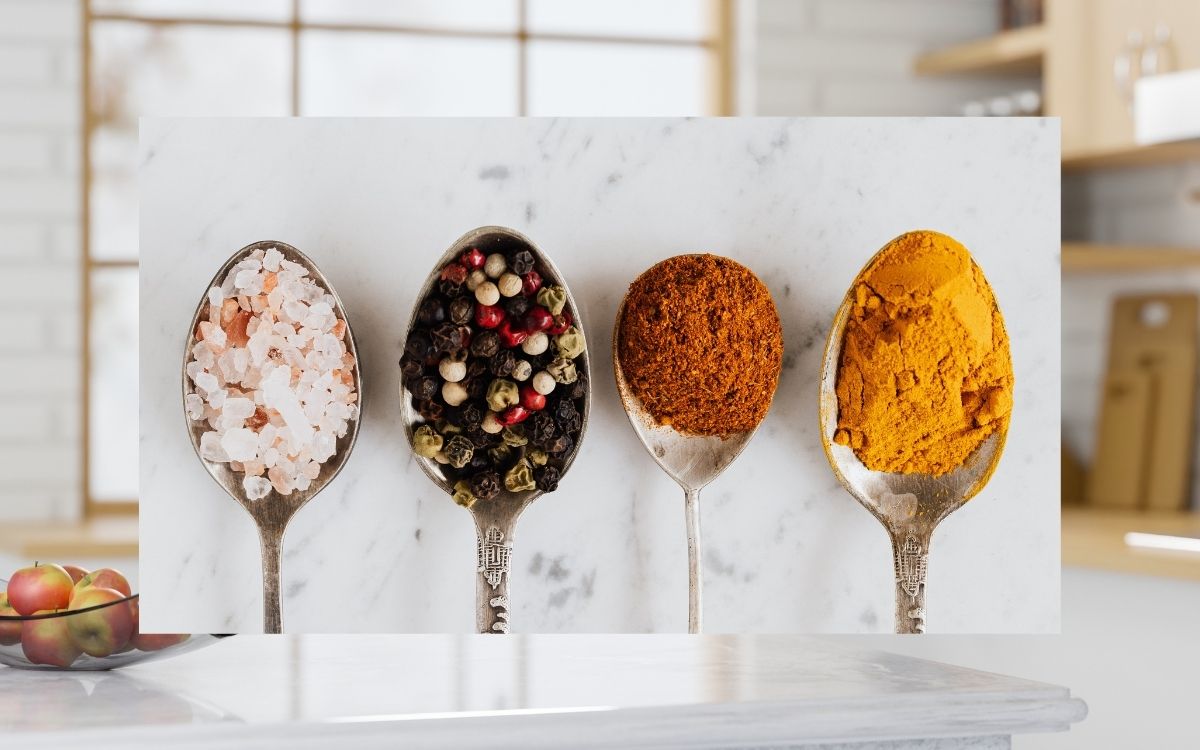Herbs and spices are like magical ingredients that can elevate the flavor and aroma of any dish. They have been used for centuries in various cuisines around the world, not only to enhance the taste of food but also for their medicinal properties.

Whether you’re an experienced chef or a novice cook, understanding how to use herbs and spices effectively can take your culinary creations to the next level. In this article, we will delve into the art of using herbs and spices, providing you with valuable tips and techniques to maximize their potential. So let’s dive in and discover the wonderful world of herbs and spices!
Understanding Herbs and Spices
In order to truly make the most out of your herbs and spices, it’s important to have a solid understanding of what they are and how they differ from one another. Let’s delve into the world of herbs and spices and explore their unique characteristics and uses.
The Difference Between Herbs and Spices
While the terms “herbs” and “spices” are often used interchangeably, they have distinct differences. Herbs are typically derived from the leaves of plants and are valued for their aromatic and flavorful properties. Common examples of herbs include basil, rosemary, thyme, oregano, and parsley.
On the other hand, spices are obtained from various parts of plants, such as the bark, seeds, or roots. Spices are known for their intense flavors and are often used to add warmth, depth, and complexity to dishes. Popular spices include cumin, paprika, turmeric, cinnamon, and nutmeg.
Understanding the distinction between herbs and spices is essential as it allows you to choose the right ingredients for your recipes and tailor your flavor profiles accordingly.
Common Herbs and Their Uses
Basil
Basil is a versatile herb with a sweet and slightly peppery taste. It is commonly used in Italian cuisine and pairs well with tomatoes, pasta, salads, and pesto sauce. It can also be used to infuse oils and vinegars.
Rosemary
With its woody aroma and robust flavor, rosemary is a beloved herb in Mediterranean cooking. It works wonderfully with roasted meats, potatoes, bread, and marinades, adding a delightful earthy note to dishes.
Thyme
Known for its aromatic and slightly minty flavor, thyme is a staple herb in many kitchens. It pairs well with a wide range of ingredients, including poultry, vegetables, soups, and stews. Thyme also adds a lovely touch to homemade bread and sauces.
Oregano
Oregano offers a pungent and slightly bitter taste, making it a popular choice for Italian and Greek dishes. It complements tomato-based sauces, pizza, grilled meats, and roasted vegetables, infusing them with a distinct Mediterranean flair.
Parsley
Parsley is a bright and refreshing herb that is often used as a garnish. However, it also brings a vibrant flavor to dishes when used in larger quantities. It works well in salads, soups, sauces, and as a flavorful addition to marinades.
Popular Spices and Their Uses
Cumin
Cumin has a warm and earthy flavor with a hint of smokiness. It is commonly used in Indian, Mexican, and Middle Eastern cuisines. Cumin adds depth to curries, chili, roasted vegetables, and spice blends like garam masala.
Paprika
Paprika is a vibrant red spice made from dried and ground bell peppers or chili peppers. It ranges in flavor from mild and sweet to hot and smoky. Paprika is frequently used in Hungarian, Spanish, and Moroccan dishes, as well as in rubs, marinades, and stews.
Turmeric
Turmeric has a distinct golden color and a slightly bitter taste. It is a staple in Indian and Southeast Asian cuisines and is renowned for its anti-inflammatory properties. Turmeric adds depth to curries, rice dishes, smoothies, and even golden milk.
Cinnamon
Cinnamon is a warm and aromatic spice with a sweet and slightly woody flavor. It is commonly used in baking, particularly in desserts like cinnamon rolls, apple pies, and cookies. Cinnamon also adds a delightful touch to warm beverages, oatmeal, and spiced meats.
Nutmeg
Nutmeg has a rich and warm flavor with hints of sweetness and spice. It is often used in both sweet and savory dishes, including baked goods, creamy sauces, custards, and spice blends. A little sprinkle of nutmeg can elevate the flavors of your favorite recipes.
Selecting and Storing Herbs and Spices
When it comes to getting the most out of your herbs and spices, selecting high-quality ingredients and storing them properly is crucial. Let’s delve into the art of choosing and preserving herbs and spices, ensuring that they retain their freshness and flavor for as long as possible.
Buying Fresh vs. Dried Herbs
When it comes to herbs, you have the option of using either fresh or dried varieties. Both have their own merits and can be utilized in different ways to enhance your dishes.
Fresh herbs, like basil, rosemary, and thyme, offer vibrant flavors and aromas that can elevate your recipes to new heights. They are best used when the recipe calls for their distinct freshness, such as in salads, marinades, and as garnishes. When selecting fresh herbs, look for bright, unwilted leaves and avoid any signs of discoloration or wilting.
On the other hand, dried herbs have the advantage of a longer shelf life and can be more convenient to have on hand. Dried herbs, like oregano and parsley, are excellent for dishes that require longer cooking times, such as soups, stews, and braises. When purchasing dried herbs, ensure that they are stored in airtight containers and check the expiration dates to guarantee their freshness.
Tips for Choosing High-Quality Spices
Selecting high-quality spices is essential to ensure that you capture their full flavor potential. Here are some tips to help you choose the best spices for your culinary endeavors:
Checking for Freshness and Aroma
Fresh spices should have a strong and distinct aroma. When purchasing spices, open the container and take a whiff to determine if the fragrance is potent. Avoid spices that have a dull or stale smell, as they may have lost their flavor.
Evaluating Spice Packaging
Opt for spices that are stored in airtight containers or packaging that provides a good seal. This helps to preserve the freshness and potency of the spices. Additionally, choose packaging that protects the spices from light, moisture, and heat, as these factors can degrade their quality.
Proper Storage Techniques
Proper storage is key to maintaining the flavor and potency of your herbs and spices. Here are some guidelines to ensure their longevity:
Storing Fresh Herbs
Fresh herbs should be treated like delicate flowers. To extend their shelf life, trim the ends of the stems and place them in a glass of water, similar to a bouquet. Cover the herbs loosely with a plastic bag and store them in the refrigerator. Alternatively, you can wrap them in damp paper towels and place them in a resealable plastic bag. Use fresh herbs within a few days for the best results.
Storing Dried Herbs and Spices
Dried herbs and spices should be stored in airtight containers away from direct sunlight and heat sources. Keep them in a cool, dark place, such as a pantry or spice rack. Properly stored dried herbs can maintain their quality for up to a year, while ground spices are best used within six months.
Maximizing Shelf Life and Maintaining Flavor
To maximize the shelf life of your herbs and spices, avoid exposing them to excessive moisture or heat. Additionally, always use clean and dry measuring spoons to avoid introducing moisture or contaminants into the containers.
Using Herbs and Spices for Health Benefits
Herbs and spices not only add incredible flavors to our dishes but also offer a wide array of health benefits. Incorporating these natural ingredients into our meals can contribute to our overall well-being. Let’s explore the various health benefits of herbs and spices and discover how to harness their potential for a healthier lifestyle.
Health Benefits of Herbs
Antioxidant Properties
Many herbs, such as oregano, rosemary, and basil, are rich in antioxidants. These powerful compounds help protect our cells from damage caused by free radicals, which are unstable molecules that can lead to chronic diseases like cancer and heart disease.
Anti-Inflammatory Effects
Certain herbs, including ginger and turmeric, possess anti-inflammatory properties. Chronic inflammation has been linked to various health conditions, such as arthritis, diabetes, and even certain types of cancer. Incorporating anti-inflammatory herbs into our meals can help reduce inflammation in the body.
Digestive Aid
Some herbs, like peppermint and chamomile, have been traditionally used for their digestive benefits. They can soothe the stomach, relieve bloating and indigestion, and support healthy digestion. Adding these herbs to teas or incorporating them into meals can promote better digestive health.
Health Benefits of Spices
Boosting Metabolism
Certain spices, such as cayenne pepper and black pepper, have been found to boost metabolism and promote weight loss. These spices contain compounds that can increase thermogenesis, which is the process of generating heat in the body and burning calories.
Supporting Immune Function
Spices like garlic, ginger, and cinnamon are known for their immune-boosting properties. They contain antimicrobial and anti-inflammatory compounds that can help strengthen the immune system and protect against common illnesses.
Managing Blood Sugar Levels
Spices such as cinnamon and fenugreek have been shown to help regulate blood sugar levels. They can improve insulin sensitivity and reduce insulin resistance, making them beneficial for individuals with diabetes or those at risk of developing the condition.
Tips and Tricks for Using Herbs and Spices
Mastering the art of using herbs and spices can truly elevate your culinary creations. With the right techniques and a little creativity, you can unlock a world of flavors and transform ordinary dishes into extraordinary ones. Here are some tips and tricks to help you make the most out of your herbs and spices.
Balancing Flavors
Start with Small Quantities
When experimenting with new herbs and spices, it’s best to start with small amounts and gradually add more as needed. This allows you to achieve a balanced flavor without overpowering the dish.
Consider Flavor Profiles
Different herbs and spices have distinct flavor profiles. Familiarize yourself with their characteristics and pair them with ingredients that complement their taste. For example, the warm and earthy notes of cumin go well with beans and grilled meats, while the bright and citrusy flavor of coriander complements seafood and vegetables.
Combining Herbs and Spices
Create Your Own Spice Blends
Customize your flavor combinations by creating your own spice blends. Experiment with different ratios of spices like cumin, paprika, and coriander to create unique blends that suit your taste preferences.
Use Herbs and Spices in Marinades
Marinades are an excellent way to infuse flavors into meats, poultry, and vegetables. Combine herbs, spices, oils, and acidic ingredients like lemon juice or vinegar to create delicious marinades that tenderize and flavor your ingredients.
Maximizing Freshness
Grind Whole Spices when Needed
Whole spices have a longer shelf life compared to pre-ground ones. Invest in a spice grinder or mortar and pestle and grind your whole spices just before using them. This ensures maximum freshness and flavor.
Freezing Herbs
Extend the shelf life of fresh herbs by freezing them. Chop the herbs and place them in an ice cube tray, then cover them with water or oil and freeze. These herb-infused cubes can be easily added to soups, stews, or sauces whenever you need a burst of flavor.
Storing and Organizing
Label Your Spices
Properly label your spice containers to easily identify them. Include the name of the spice, the date of purchase, and the expiration date. This helps you keep track of the freshness of your herbs and spices and ensures you use them before they lose their potency.
Keep Spices Away from Heat and Light
Store your herbs and spices in a cool, dark place, away from heat sources and direct sunlight. Exposure to light, heat, and moisture can degrade their quality and flavor.
Conclusion
Herbs and spices are the secret weapons in your kitchen that can transform ordinary meals into extraordinary culinary experiences. By incorporating a variety of herbs and spices into your cooking, you can unleash a world of flavors, aromas, and health benefits. Remember to experiment with different combinations, understand the characteristics of each herb and spice, and use them in the appropriate amounts to achieve the desired outcome. Don’t be afraid to explore new flavors and step out of your comfort zone.









